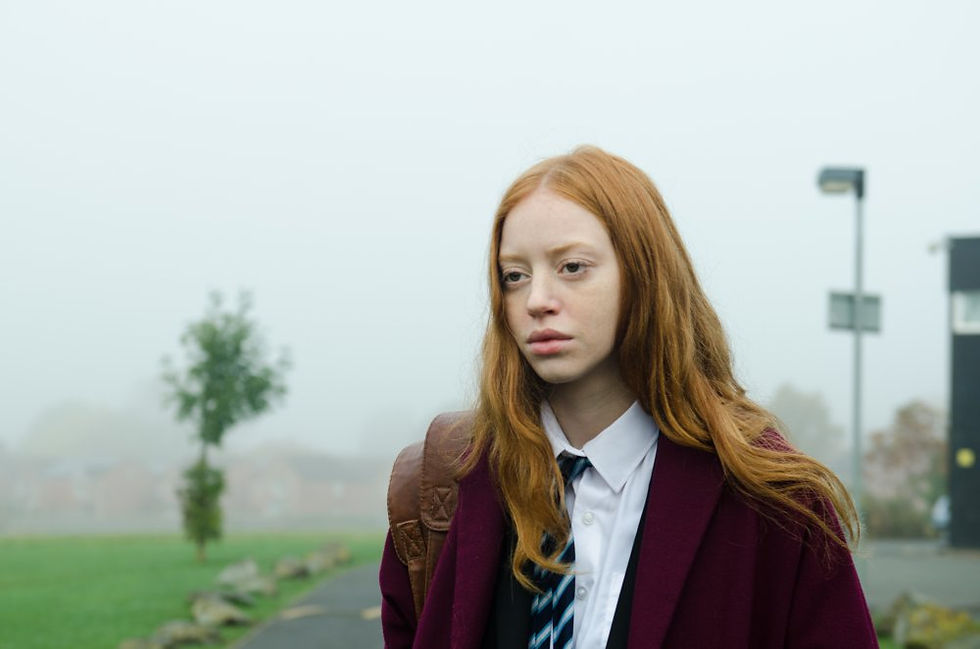DEBORAH HAYWOOD: 2019 (TALENT LAB)
- ANYA CINNAMON MACHIN

- Mar 6, 2019
- 5 min read
Throughout talent lab we had the opportunity to meet a bunch of amazing filmmakers and editors, for our directing workshop we had the pleasure of meeting Deborah Haywood. Haywood has worked on multiple well-known films such as Sis, Pin Cushion, Tender, Biatch and Lady Margret amongst many more. Meeting Haywood opened my eyes to what to expect when leaving university, Haywood speaks honestly and openly about her struggles to get into the film industry and how not to expect to make thousands to start with. Haywood went on to explain that when she turned 17 she had her first child, with the realisation that her life wasn’t where she wanted it when her boyfriend went to prison she became lonely sitting at home with the baby, she decided it was her shot to make something of her life, her close friend mentioned an access course that she could do, she applied for a module of creative writing where she focused on poetry, scriptwriting and filmmaking. She was able to get a grant that helped pay for her tuition and child care yet this got her into a lot of debt.
After her course had finished she sent a short story directly to Dave Eggers site and it was accepted, This gave Haywood a lot of confidence there for she made another script, it was passed on to a big director at the time who decided not to take it as they quote “didn’t think anyone would be that thick”, this brought Haywood’s confidence down a notch as the script was in fact about her life, she started to think she wasn’t good enough or posh enough for the job she desired.
Haywood then went on to start a 6 session writing course that at the end people got picked to go through, a film “Lady Marget” got through and Haywood was asked to direct the short, although this was a huge step into the industry for Haywood she was terrified, the realisation that it was her job to lead people, she explained that the terror never leaves you even when your making your first feature, this was something unusably comforting to me, that even the greatest director still feel fear. Throughout Lady Margret she came to the realisation that the people around her may have more experience yet she wrote the script and no one else knew her vision like she did, they might have an idea yet not every element, this film taught her when working with teenagers not to give them the script too soon as they often over practise, she in fact found it was easier to work with children as they aren’t as self conscious. Haywood then went on to discuss shorts explaining if your creating a short film ensure you keep it as short as possible, as festivals have so many film to watch and there not always getting paid for it, the shorter films are more likely to be watched.
When working on Pin cushion she realised improvisational work takes much longer as actors have free range to do as they wish, yet this is much harder as within the edit you must remove a lot more that is much more complicated than sticking to a script. Advice she gave was to take a break from what your working on, Haywood went to India and worked over email, on her return she saw a difference, coming back with a fresh pair of eyes realizing the issues more when she arrived back after a break.
Haywood went on to discuss how there’s so many films and filmmakers around now and to make a difference you have to make a splash to be noticed in this industry, you have to write about something that means something to you, keep it interesting from start, middle to end and don’t allow the story to start three pages in or you will loose your audiences attention, She offered explained her story of working with D.O.P’s who have done features beforehand, she noticed when they looked at the script they became snobby, they then took advantage of her having no producer and started removing certain shots from the film, She got in contact with Lenny A who made Room and Garage, she was mentored by him and explained her situation with the current D.O.P, Lenny explained she must grit her teeth as it’s a short film, and gave some good advice that you must cast your crew as you cast your actors. She also explained you never loose, you either win or you learn and this was something that really eased my nerves when considering the future.
Haywood then went on to focus on feature films, she explained that in 2018 she only made 6 grand due to working on her feature film, she made her first feature 20 years after starting to write film and 10 years from her first short film to feature film. She spoke of her frustration that many girls make short films yet drop feature films, women have to work harder and try more as there’s a 50/50 ratio of male and females studying film yet women end up dropping out.
She went on to give us some information on feature films, first a feature film runs from 70-90 minuets on average, Haywood never uses character biography she just writes as a short story, when applying for funding you must give a 50 word synopsis, then a 500 work synopsis, the write in 5 pages, you must work out the beats and not get stuck on little details. Haywood explained to always start at the ending, as hat will tell you your beginning, she explained it as finding a diamond in a rock you have to keep chipping away, Haywood went to live in Amsterdam for five months to write her script, she noticed it was turning very art house when she wanted more narrative, she then applied for IFAX they wanted the opposite to Haywood they wanted plot after plot after plot to make it as commercial as possible, the film was eventually booted off due to it having scenes of a 15 year old girl masturbating, men working there had teen daughters and felt uncomfortable.
Haywood left Amsterdam feeling defeated, the original script was so close to her DNA so she took it to a producer who decided he also preferred the original script, this pissed Haywood off due to the past 4 years of her life had been focused on character development and being asked to change the script, eventually she was given 6 grand for her treatment, this gave her the opportunity to not have to find a job so that she could focus on her treatment, she was then given another 6 grand to write her script, Haywood explained how they pay you per draft or per stage of development, half when starting, then you get more. As soon as you have your money start looking for crew, the a producer that has your back and vision, turn up with pictures, diagrams, emotions, show reels all that show you can tell a story, her final information for us was rest is the best prep you can do.




Comments